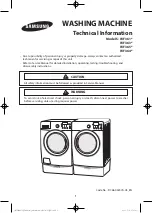
8
KX-TGH260/KX-TGH262/KX-TGH263/KX-TGH264/KX-TGHA20/KX-TGA20
4 Technical Descriptions
4.1.
US-DECT Description
The frequency range of 1.92 GHz-1.93 GHz is used. Transmitting and receiving carrier between base unit and handset is same
frequency. Refer to
Frequency Table
(P.60).
4.1.1.
TDD Frame Format
4.1.2.
TDMA system
This system is the cycles of 10 ms, and has 6 duplex paths, but maximum duplex communication path is 5 because of dummy
bearer use.
In 1 slot 417
μ
s, the 10 ms of voice data is transmitted.
•
2 - Handsets Link
Traffic Bearer
A link is established between base unit and handset.
The state where duplex communication is performed.
Handset doesn't make up duplex in no free RF channels because of interference. (*1)
Dummy Bearer
Base unit sends Dummy-data to the all stand-by state handsets.
Handsets receive that data for synchronization and monitoring request from the base unit.
Base unit doesn't send Dummy bearer in no free RF channels because of interference. (*1)
Note:
(*1) It is a feature under FCC 15 regulation and for interference avoidance.
In the case of checking RF parts, it is better in least interference condition.
417
μ
s (available) 417
μ
s (blind)
5 ms
5 ms
Up Link ( Handset -> Base Unit )
Down Link ( Base Unit -> Handset )
DATA rate : 1.152 Mbps
RX1
RX2
RX3
RX4
RX5
RX6
TX1
TX2
TX3
TX4
TX5
TX6
RX1 RX2 RX3 RX4 RX5 RX6 TX1 TX2 TX3 TX4 TX5 TX6
TX
RX
RX
TX
Traffic Bearer
Dummy bearer
Base unit
Handset 1
(Stand by)
Handset 2
(Link)
Handset 3
(Link)









































